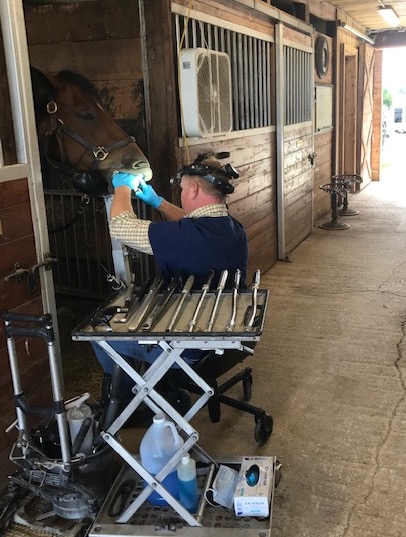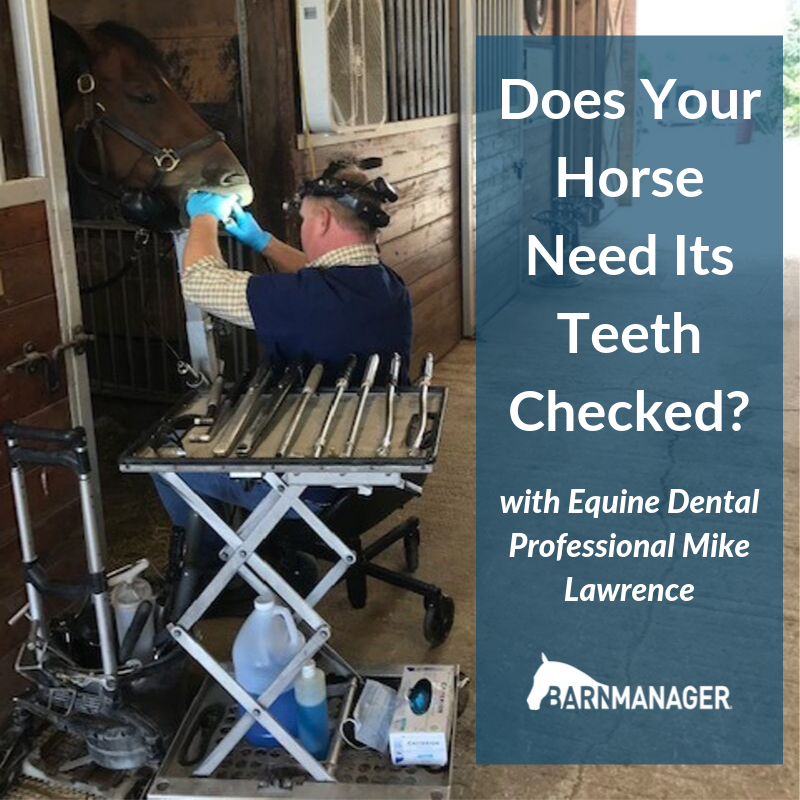What to Look for to Determine if Your Horse Needs Dentistry
By Mike Lawrence
Proper dentistry is an integral aspect of optimal horse welfare. As an owner, trainer, rider, or barn manager it is very important to be aware of symptoms that indicate your horse is due for dental care.
The easiest way to know a horse is due for dental maintenance is to put a reminder into the horse’s BarnManager record for a dental exam every six months.
 Horses’ teeth naturally erupt and develop sharp enamel points when they masticate. These points can abrade the tissues of the mouth and cause your horse discomfort. These points and malocclusions, or deviations from normal dental contact, can also affect the natural motion of the mandible when chewing or being ridden, particularly if the horse wears a tight noseband.
Horses’ teeth naturally erupt and develop sharp enamel points when they masticate. These points can abrade the tissues of the mouth and cause your horse discomfort. These points and malocclusions, or deviations from normal dental contact, can also affect the natural motion of the mandible when chewing or being ridden, particularly if the horse wears a tight noseband.
If a horse’s teeth are regularly maintained it is more likely that the horse will have normal dentition and not exhibit dental symptoms when eating or being ridden.
Here are several signs and symptoms that indicate it could be time to call an equine dental professional:
– Eating abnormally, dropping grain, and quidding hay are all symptoms that your horse’s teeth should be checked. Eating related symptoms often may indicate an acute change in a horse’s condition or reveal an advanced chronic condition.
– Any musculoskeletal abnormalities such as atrophy of the masseter muscles or over-developed temporalis muscles in the forelock area are symptoms of abnormal mastication. Often your veterinarian, chiropractor, or body work therapist may observe body issues that appear to have a primary dental origin. That is why for optimal equine care it is important that the person responsible for the horse’s care shares relevant information, so all the health care providers can work as a team to help your horse.
– Facial swelling, odor, and/or drooling are signs of acute issues that warrant immediate dental and veterinary attention.
– Riding issues such as head tossing, rooting, head tilting, resistance, or not staying on contact are also key symptoms that your horse needs to see a dental professional.
– Looking at the incisors for asymmetries or excessive length is another way to determine if your horse needs to see a dental provider.
These are some of the many clues that your horse’s teeth may be bothering them. If you keep your horse on a regular preventative maintenance dental schedule, often many of these issues can be averted. Dental conditions are not always the primary cause of these symptoms but frequently are. It is best not to wait for an acute dental problem to occur and your horse to be in discomfort, before we check its teeth.

Mike Lawrence has been practicing equine dental maintenance since 1992 and is a Certified Member of the International Association of Equine Dentistry. To locate an IAED certified veterinarian or dental provider in your area, visit iaedonline.com.
